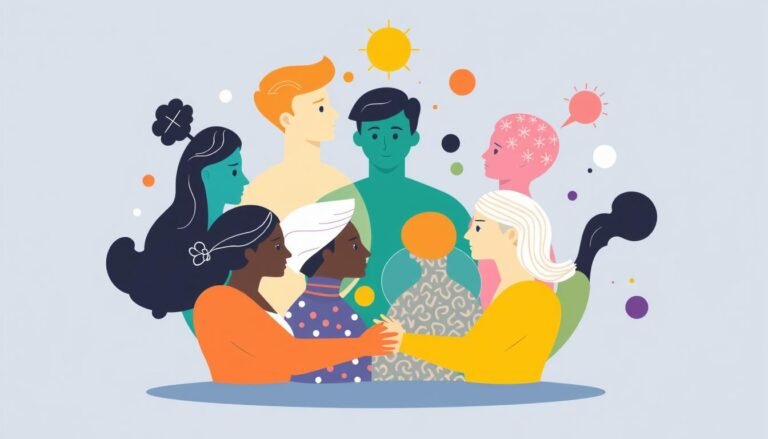Personality and Job Satisfaction: Finding Your Fit
Sarah walked into her office, feeling the weight of another day ahead. She was a marketing manager, but something felt off. The constant pressure to network and lead team meetings drained her introverted nature.
She longed for quiet moments to analyze data and craft strategies alone. Sarah’s story isn’t unique. Many professionals struggle to find the sweet spot where their personality aligns with their job demands.
A recent study of 6,962 British workers sheds light on this issue. It found that certain personality traits, like agreeableness and conscientiousness, often lead to higher job satisfaction. On the flip side, neuroticism tends to decrease workplace happiness. These findings highlight the crucial link between personality and job satisfaction.
In today’s job market, finding the right fit is more important than ever. Employers are catching on, with 32% using personality tests for executive roles. This trend extends to middle management and entry-level positions too. It’s clear that both companies and workers are realizing the value of matching personalities to jobs.
Understanding your personality can be a game-changer for your career. It’s not just about skills or experience. Your natural tendencies play a big role in how you handle stress, interact with others, and find fulfillment at work.
By aligning your personality with your job, you’re more likely to achieve a healthy work-life balance and boost your emotional intelligence.
Key Takeaways
- Personality traits significantly impact job satisfaction and performance
- Employers increasingly use personality tests in hiring processes
- Matching personality to job requirements can lead to better work-life balance
- Understanding your personality traits can guide career choices
- Emotional intelligence plays a crucial role in workplace success
- The right personality-job fit can increase job satisfaction and retention
Understanding the Link Between Personality and Job Satisfaction
Personality greatly affects how happy we are at work. Studies have shown that our traits can change how we feel about our jobs. This includes how engaged and motivated we are in our work environment.
The Five-Factor Model of Personality
The Five-Factor Model, or the Big Five, helps us understand different personality traits:
- Conscientiousness
- Emotional Stability
- Extraversion
- Agreeableness
- Openness to Experience
Research has found that these traits really matter for job happiness. A study with 150 employees from different places showed a clear link between certain personality traits and job happiness.
Job Satisfaction: Definition and Importance
Job satisfaction means feeling good about our work. It covers how we think, feel, and act at work. Happy employees are more productive and creative, helping the company grow and stay positive.
Theories Connecting Personality and Job Satisfaction
There are theories that explain how personality and job satisfaction are linked:
- Person-Environment Fit Theory
- Self-Regulation Theory
- Social Learning Theory
These theories help us see how our traits affect our behavior and happiness at work. For example, a study in Chinese banks found that those who were outgoing and agreeable were happier at their jobs.
| Personality Trait | Impact on Job Satisfaction |
|---|---|
| Agreeableness | Positive correlation |
| Openness | Positive correlation |
| Conscientiousness | Positive correlation |
| Emotional Stability | Positive correlation in service sector |
Knowing these connections can help companies keep their employees happy and engaged. By creating a work environment that fits different personalities, companies can boost motivation and job satisfaction.
The Impact of Personality Traits on Workplace Performance
Personality traits greatly affect how well we do at work and our career growth. Studies have found that some traits are key to success in many jobs.
Being conscientious is the best trait for most jobs. People with this trait are organized, responsible, and focused. They do well in sales, customer service, and other professional areas.
Extraversion is great for jobs that need good people skills. Extraverts do well in sales and leadership. Their outgoing nature helps with networking and public speaking, which can help them move up in their careers.
Being emotionally stable helps reduce stress and boosts job happiness. Stable people handle work pressures better. This leads to better performance and overall happiness.
| Personality Trait | Impact on Performance | Career Benefits |
|---|---|---|
| Conscientiousness | High productivity, reliability | Career advancement, goal achievement |
| Extraversion | Effective communication, leadership | Networking opportunities, visibility |
| Emotional Stability | Stress management, adaptability | Improved job satisfaction, work-life balance |
| Agreeableness | Teamwork, conflict resolution | Positive workplace relationships |
| Openness to Experience | Innovation, problem-solving | Adaptability, career growth |
Knowing your personality traits can help you find the right job. When your personal traits match your job, you’re happier and do better. This helps you succeed in your career for the long term.
Personality and Job Satisfaction: Key Connections
Understanding how personality affects job satisfaction is key to a fulfilling career. Recent studies have shown how our unique traits shape our work experiences. They also impact our overall happiness at work.
How Personality Influences Motivation and Goal Achievement
Research shows that certain personality traits are crucial for workplace motivation. A study of 202 Italian workers found that Conscientiousness is strongly linked to job satisfaction. This trait is especially important for younger and average-age workers.
The Role of Personality in Interpersonal Relationships at Work
Our personality greatly influences how we interact with colleagues and superiors. Emotional intelligence is a key factor in workplace relationships. It can greatly impact job satisfaction.
People with high emotional intelligence often find it easier to navigate office politics. They also maintain a healthy work-life balance.
Personality Traits and Organizational Citizenship Behavior
Certain personality traits are linked to increased organizational citizenship behavior. A study of 3,288 Canadian adults found that job attributes, biographic characteristics, and personality all contribute to job satisfaction. Employees who are satisfied with their jobs are more likely to go above and beyond their basic duties.
“People choose jobs, learning institutions, and leisure activities based on their personality structures and to meet certain needs.”
This insight shows the importance of finding a work environment that aligns with your personality. It’s crucial for long-term career satisfaction and success.
Assessing Your Personality for Career Success
Understanding your personality is crucial for finding a job that makes you happy. Personality tests give you insights into your strengths. This helps you make smart career choices and show your best side in job applications.
The Five-Factor Model, or OCEAN Model, is a popular personality test. It looks at five main traits:
- Openness to Experience
- Conscientiousness
- Extraversion
- Agreeableness
- Neuroticism
Studies show that those who are emotionally stable and conscientious often earn more and are happier at work. Extraverts usually get more promotions and reach higher management levels. This helps in career growth.
| Benefit | Impact |
|---|---|
| Reduced turnover rates | Up to 20% reduction |
| Cost savings | Avoid $17,000 – $240,000 per bad hire |
| Improved employee engagement | Enhanced team collaboration |
| Better hiring efficiency | Identify hidden potential |
By matching your personality with job needs, you can increase motivation. This way, you find a role that really suits you. Remember, self-assessment is a continuous journey. It guides your career growth and leads to lasting professional happiness.
The Importance of Job Fit in Career Satisfaction
Finding the right job is key to your happiness and well-being. When your skills, values, and personality match your job, you do well both at work and in life.
Person-Environment Fit Theory
Person-environment fit theory says job happiness comes from a good match between you and your job. This includes fitting well with your boss, coworkers, and the company. Studies show that a good fit leads to more job satisfaction, better relationships, and loyalty to your company.
The Consequences of Poor Job Fit
Poor job fit can make you stressed and less productive. If your job doesn’t match your skills or values, you might feel burned out and unhappy. This can cause you to leave your job and affect your work-life balance.
Benefits of Finding the Right Job Fit
Finding the right job has many advantages:
- More job satisfaction and engagement
- Better performance and productivity
- Improved work-life balance
- More chances for career growth
- Less job stress
Research shows that those who fit well in their jobs are happier and stay longer. Choosing a job that matches your skills and personality leads to long-term success and happiness.
Personality Profiling in the Hiring Process
Companies are now using personality profiling to find the perfect fit for their culture. This change is altering how they engage employees and help them grow. A recent survey by the Society for Human Resource Management shows 71% of organizations use these assessments in hiring.
The Core Values Index (CVI) is a top tool for checking individual traits and team dynamics. It has a 97.7% reliability rate, giving deep insights into a candidate’s fit for a role.
Personality profiling does more than just hire. It helps create work environments that fit each person better. This leads to stronger employee relationships. Gallup reports a 5-20% productivity increase in companies using these assessments.
“Personality assessments can predict job performance by as much as 20-25%, minimizing employee turnover by 15%.”
It’s not just about doing well on the job. Employees who take these tests often feel happier in their roles. A study by the Society for Human Resource Management found 70% of employees felt more content after taking these tests.
Yet, using personality profiling wisely is key. About 50% of job applicants might try to change their answers to fit what the company wants. This shows the importance of balancing these assessments with other hiring methods.
Strategies for Finding a Job That Matches Your Personality
Finding a job that fits your personality can make you happier and help you grow in your career. Research shows that 95% of workers are more satisfied when their job matches their core traits.
Self-Assessment Techniques
First, get to know yourself. Try personality tests like the Myers-Briggs Type Indicator or Big Five Personality Traits. These tools can show your strengths, values, and what you like in a job. Remember, 85% of professionals use these tests to choose their careers.
Researching Company Culture and Work Environments
Don’t just look at job descriptions. Check out company websites and social media to see their culture. About 55% of employees consider company culture when looking for a job. This research helps you find a place that supports your emotional intelligence and growth.
Asking the Right Questions During Job Interviews
Use interviews to check if the job is right for you. Ask about team dynamics, work environment, and company values. This can show if the job fits your personality and career goals.
| Personality Type | Suitable Job Roles | Work Environment |
|---|---|---|
| Introverted | Accountant, Coder, Editor | Quiet, Individual-focused |
| Extroverted | Sales, Marketing, Teaching | Social, Team-oriented |
| Creative | Graphic Designer, Copywriter | Flexible, Innovative |
| Analytical | Data Scientist, Researcher | Structured, Detail-oriented |
By using these strategies, you can find a job that fits your skills and personality. This leads to more job satisfaction and career success.
Adapting to Your Work Environment: Balancing Personality and Professional Demands
Finding the right balance between your personality and work is crucial for happiness. Research shows that who you are affects how you manage work and personal life. Let’s explore some interesting facts about personality and work habits.
High achievers often find it hard to balance work and life. Only 30% of them are happy with their balance. Even those making over $200,000 struggle, with just 9% feeling good about their mix.
But, 20% of cautious or pessimistic people making $25,000 to $50,000 are content. This shows that money isn’t the only factor in achieving work-life balance.
Personality also shapes our work habits. Extroverts tend to be happier with their balance, with 17% saying it’s great. Introverts, however, are less likely, with only 4.7% feeling the same. Some work long hours, over 70 hours a week, while others work less than 20 hours.
| Personality Type | Work-Life Balance Satisfaction | Weekly Work Hours |
|---|---|---|
| High Achievers | 30% | 70+ |
| Cautious/Pessimistic | 20% | 20-40 |
| Extroverts | 17% | Varies |
| Introverts | 4.7% | Varies |
Building emotional intelligence can help you tackle these challenges. It’s about knowing your personality and using it to your advantage. It’s okay to adapt, but don’t change who you are. Find a job that matches your natural strengths for a happier work life.
Conclusion
The way our personality affects job satisfaction is very important for our careers. Our study found interesting things about this connection. Women, who made up 66.3% of our participants, showed more neuroticism than men.
The Big Five Personality Inventory showed some cool connections. Extroversion and conscientiousness were weakly linked to job happiness. Agreeableness had a moderate positive link. But neuroticism had a moderate negative link to job satisfaction.
Age and gender are big factors in how personality affects job fit. Younger people tend to see a stronger link between personality and job happiness. Interestingly, low extroversion was linked to higher job satisfaction in certain roles. But extroverts were happier in jobs that needed lots of networking.
Finding the right job is crucial for success. People who are conscientious do well in social settings. They get respect and feel fulfilled. Knowing these connections helps both employees and employers make better choices. This leads to better performance and happiness at work.
Source Links
- Associations between Personality Traits and Areas of Job Satisfaction: Pay, Work Itself, Security, and Hours Worked
- How the Person-Environment Fit Ties to Job Satisfaction and… | Birkman
- Personality and Job Performance | Predictive Factors
- The Role of Employees’ Personality Characteristics in Job Performance and Satisfaction during Digitization Years
- How personality impacts work performance and career success
- Personality traits, workers’ age, and job satisfaction: The moderated effect of conscientiousness
- Personality and job satisfaction | Semantic Scholar
- Personality Assessments in the Workplace
- Personality and Career Success: Concurrent and Longitudinal Relations
- The Importance of Person-Job Fit – Workr Beeing | The Science Of Thriving Workplaces
- The Importance of Job Fit for Federal Agencies and Employees
- Frontiers | Person–Job Fit and Innovation Behavior: Roles of Job Involvement and Career Commitment
- How do personality tests influence hiring decisions and employee performance?
- Can Personality Tests Accurately Predict Job Performance and Satisfaction?
- Why Personality Assessments are Beneficial in the Workplace – HSI
- No title found
- Aligning Your Personality Traits with Your Career Choices for Optimal Satisfaction – Resiliency at Work 2.0
- Matching Your Job to Your Personality
- Navigating Work-Life Balance: How Different Personality Types Respond to New Work | Personality Path
- Personality, Attitudes, and Behaviors
- The Role of Personality in Job Satisfaction Among Collegiate Athletic Trainers
- The Relationship between Big 5 Personality Traits and Job Satisfaction








